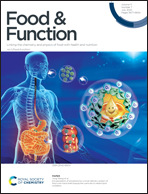Antidiabetic effects of selenium-enriched Bifidobacterium longum DD98 in type 2 diabetes model of mice†
Abstract
Both selenium and probiotics have shown antidiabetic effects in a type 2 diabetes model. The objective of this study is to investigate the alleviating effects of selenium-enriched Bifidobacterium longum DD98 (Se-B. longum DD98) on diabetes in mice and explore the possible underlying mechanism. A type 2 diabetes model was established using a high-fat diet and streptozotocin (STZ) injection in mice. To investigate the beneficial effects of Se-B. longum DD98, diabetic mice were then treated with B. longum DD98, Se-B. longum DD98, or sodium selenite (Na2SeO3) for three weeks. The results suggested that all three treatments could reduce the levels of fasting blood glucose (FBG), glycated hemoglobin (HbA1c), insulin and leptin, improve glucose tolerance, regulate lipid metabolism, and protect against the impairment of the liver and pancreas, while Se-B. longum DD98 showed a greater effect on relieving the above mentioned symptoms of type 2 diabetes in mice. Furthermore, this effect was associated with butyrate production and inflammatory response. Se-B. longum DD98 better increased the level of butyrate in feces and decreased the levels of proinflammatory cytokines in the pancreas compared with B. longum DD98 and Na2SeO3, leading to ameliorative insulin resistance. Se-B. longum DD98 also improved the glucagon like peptide-1 (GLP-1) level in serum and intestinal cells, which protected the pancreatic β-islet cells from damage induced by type 2 diabetes. These results demonstrated that Na2SeO3, B. longum DD98, or Se-B. longum DD98 could alleviate the progression of type 2 diabetes in mice. Se-B. longum DD98 showed greater antidiabetic effects than the other two treatments, and could be considered as a promising candidate for treating type 2 diabetes.



 Please wait while we load your content...
Please wait while we load your content...